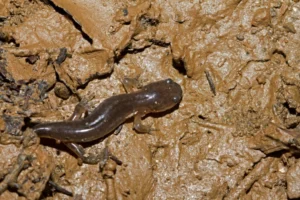Salamanders are quiet, secretive amphibians that rely a lot on their senses to get through life. One sense they use more than most is smell. Unlike mammals, salamanders don’t breathe through their noses. Instead, they have chemical sensors in their skin and mouth that help them understand what’s around them.
Salamanders don’t like strong or unnatural smells. Vinegar, bleach, ammonia, citrus oils, and artificial fragrances can irritate their permeable skin and change how they act. When these smells are around, salamanders usually stay away.
Salamanders Have a Very Sensitive Sense of Smell
Salamanders have a very sensitive olfactory system (that’s the part of their body that detects smells). It helps them find food, find mates, stay away from predators, and know which areas are safe.

For example, a salamander can smell insects or worms hiding under leaves or underground. The same sensitivity warns them if danger is nearby.
Because they rely so much on these chemical signals, strong or unfamiliar smells can overwhelm them and make them avoid certain places.
Why Strong Smells Like Vinegar and Citrus Are a Problem
Strong smells like vinegar or citrus are common in homes, but salamanders find them too strong. Vinegar contains acetic acid, which has a sharp scent that can irritate their skin.
When these smells are nearby, salamanders often move away. These smells aren’t part of their natural environment and can cover up the chemical signals they depend on.
Even small amounts usually don’t harm them physically, but the smells can still change how they behave.
Chemical Cleaners and Disinfectants Can Be Harmful
Chemicals like bleach, ammonia, and chlorine are especially irritating to amphibians. They release strong fumes that can hurt the skin and make it harder for salamanders to breathe.
Since salamanders partly breathe through their skin, these chemicals can cause serious stress or even injury.
Even tiny traces can make them confused or drive them away.
Amphibians naturally avoid areas with these chemicals, even at low levels.
Synthetic Fragrances Can Mess With Their Behavior
Many air fresheners, scented candles, and sprays contain artificial chemicals that smell very strong. Even if they are labeled safe for pets, salamanders can be overwhelmed by them.

In small spaces like tanks or terrariums, the scents can build up and stress the animals.
Salamanders exposed to strong fragrances may stop eating, become inactive, or try to escape.
People who keep salamanders as pets should avoid scented products near them.
Salamanders Can Smell Predators
Salamanders can detect natural odors left behind by predators like snakes, birds, and mammals. These chemical signals warn them about danger.
When a predator is nearby, a salamander may freeze, hide, or stay in its shelter. Even human smells, especially from soaps or lotions, can seem threatening.
This ability helps salamanders stay safe by keeping them away from risky areas.
Pollution Can Mess With Salamanders
Salamanders rely on subtle chemical signals to move through their environment, find food, and locate breeding spots.
Pollution from oil spills, pesticides, sewage, and chemicals in water or soil can mess with these signals.

If a salamander uses smell to find a breeding pond, pollution can make it lose the right path. This can reduce reproduction and shrink populations.
In serious cases, salamanders may leave polluted areas completely.
What Smells Should You Avoid Around Salamanders?
If you keep salamanders as pets or see them in nature, avoid these smells near them:
- Vinegar and citrus oils (from lemons, oranges, etc.)
- Chemical cleaners like bleach, ammonia, and chlorine
- Synthetic fragrances from air fresheners, candles, and sprays
- Pesticides and herbicides near water or soil
- Strong-smelling foods such as garlic, onions, and spicy ingredients
Even products labeled “natural” or “eco-friendly” can have ingredients that bother salamanders.
Why Salamanders’ Sense of Smell Is Important
Salamanders’ sensitivity to smell is more than just a preference, it helps them survive. Their permeable skin is thin, and their sense of smell is very sensitive to changes around them.
If chemicals mess with this sense, salamanders may have trouble finding food, mates, or noticing danger. This can put them at risk in the wild and in captivity.
Keeping their environment free from strong, unnatural smells helps protect their health and safety.
What Happens When Salamanders Come Across Bad Smells?
When salamanders are near strong or unpleasant odors, they may:
- Refuse to come out of hiding
- Stop eating
- Become inactive or stressed
- Leave the area if they can
- Show signs of skin irritation or dryness
In captivity, being around bad smells for too long can cause health problems. In the wild, these reactions help salamanders avoid danger, but they may also stay away from food or shelter.
Conclusion
Salamanders dislike strong smells like vinegar, bleach, ammonia, citrus, and artificial fragrances because these smells irritate their permeable skin and mess with the chemical signals they rely on.
These smells often signal danger or contamination, making salamanders hide, move away, or avoid the area.
Avoiding strong smells near salamanders, whether in nature or in captivity, helps keep them safe, healthy, and able to live naturally.
Hi, my name is Ezra Mushala, i have been interested animals all my life. I am the main author and editor here at snakeinformer.com.

